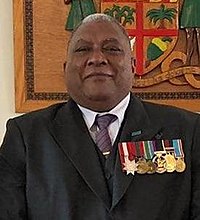Fiji’s long-time prime minister said on Thursday the military had been deployed to maintain “law and order”, as the former coup leader refused to concede defeat after a close election.
Prime Minister Frank Bainimarama, who has led Fiji since coming to power in a 2006 military putsch, cited unsubstantiated reports of post-vote ethnic violence as the reason for the deployment.
“So long as it is our responsibility to serve in government, we will fulfil our duty to every Fijian’s safety,” he said in his first public comments since the December 14 election.
That vote looks set to end Bainimarama’s long rule, with an opposition coalition cobbled together by another former coup leader, Sitiveni Rabuka, securing enough seats for a parliamentary majority.
However, Bainimarama has refused to concede defeat and his allies have delayed the parliament sitting to nominate Rabuka as the next prime minister.
Fiji has been rocked by four coups and a military mutiny in the past 35 years. There are growing concerns Bainimarama is preparing for the military to step into the political process again.
His ally, police commissioner Sitiveni Qiliho, claimed earlier to have unspecified “intelligence” about “planned civil unrest”, as he sought to justify the military deployment.
The military has wide powers to intervene in politics under Fiji’s constitution, holding “overall responsibility” at all times for ensuring “the security, defence and well-being of Fiji and all Fijians”.
New Zealand’s ministry of foreign affairs was the first from a neighbouring country to urge restraint after news of the military deployment was made public.
“We encourage all parties to allow the constitutional process to play out,” a ministry spokesperson told AFP.
Fiji’s military commander Jone Kalouniwai is said to have assured foreign diplomats before the vote took place that a coup was not on the cards.
Jon Fraenkel, a professor at Victoria University of Wellington who has just returned from Fiji, said the military’s assurances “have to be very strongly questioned”.
– ‘Living in fear’ –
News that the opposition had reached a coalition deal saw Fijians pour onto the streets to celebrate what they believed was the end of a decade and a half of semi-authoritarian rule.
While not an outright autocrat, Bainimarama has frequently had his government use the legal system to sideline opponents, silence critics and muzzle the media.
Soon after the coalition deal was struck, police expressed concern about reports of post-election “stoning incidents” and violence against the Indo-Fijian minority, which has tended to support Bainimarama.
The force later admitted the reports had not been fully investigated, but police commissioner Qiliho doubled down on claims of internecine strife on Thursday.
“More information and reports are received by the Fiji Police Force and Republic of Fiji Military Forces of threats made against minority groups who are now living in fear,” he said.
“The continuous attacks on minority groups has aggravated the current tense situation.”
Those claims were rubbished by Mahendra Chaudhry, the country’s first Indo-Fijian prime minister, who was ousted in a 2000 coup.
“I see no evidence of unrest here, people are calm and they are waiting for the president to convene parliament so that a prime minister is elected,” he told AFP.
“I have no evidence of any unrest and nor do my people out in other districts. It’s not what we are hearing on the ground.”
“The opposition got more votes and the constitution is very clear on the process to be followed in such a situation. The right thing now for everyone to do is to comply with the constitutional requirement,” Chaudhry said.
Rabuka issued a statement late Thursday saying any reports of violent incidents were “disturbing”.
“I urge the people of Fiji to respect the rule of law, and to allow the political process to continue without hindrance,” Rabuka said.
“The coalition aspires to the peaceful transition of power.”
Share your story or advertise with us: Whatsapp: +2347068606071 Email: info@newspotng.com













